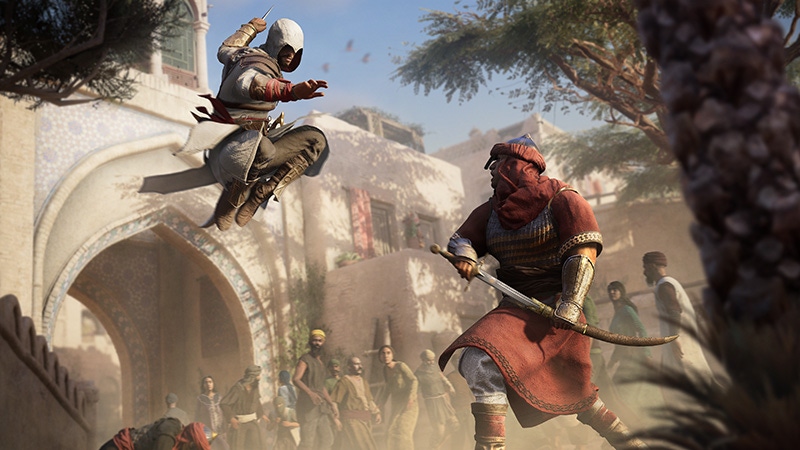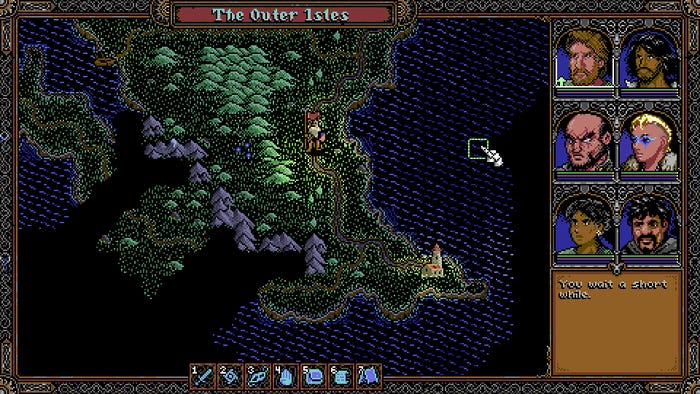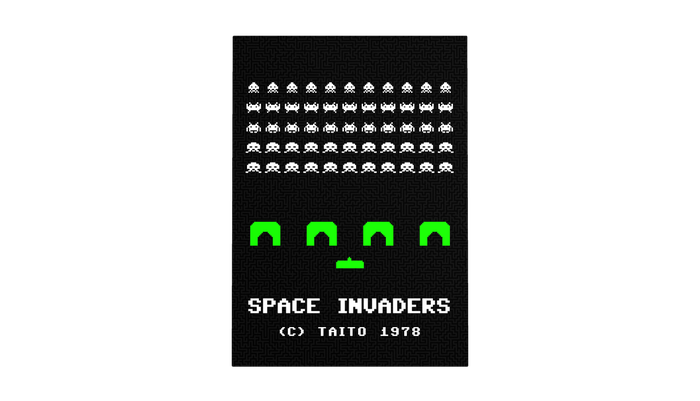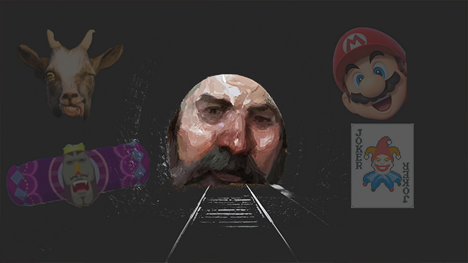Assassin's Creed: Mirage returns to its roots with a visit to Baghdad
Ubisoft Narrative director Sarah Beaulieu discusses the DLC expansion-turned full game that returns Assassin's Creed to the medieval Middle East.

Assassin's Creed: Mirage aims to bring the sprawling historical sci-fi franchise into tighter focus—and that's piqued the interest of many long-time fans. Ever since the original game's debut in 2007, the Assassin's Creed franchise has steadily grown in scope, with each new entry dwarfing the size of the previous game, the series moving away from the social steal-action format and into the genre of an open-world action RPG.
With Assassin's Creed: Mirage, developer Ubisoft Bordeaux brings the franchise back to its roots as a stealth action game set in a tightly designed city with citizens to blend in with, rooftops to run across, and tense moments where you tail and strike at unsuspecting targets. As the series returns to the formula, narrative director Sarah Beaulieu sees the game as a tribute to classic Assassin's Creed and as a homage to the lost eras of the Middle East, where the franchise first struck ground.
At the recent Ubisoft Forward showcase, Beaulieu spoke with Game Developer about forming this revisit to a classic era of Assassin's Creed.
Assassin's Creed Mirage feels like the original game
Initially planned as an expansion for the sprawling, Viking-era Assassin's Creed: Valhalla, Ubisoft devs stated that idea didn't last long, as they spun it off into its own game after seeing potential in revisiting a "classic" Assassin's Creed. As an origin story for Valhalla's supporting character and antihero Basim Ibn Ishaq, last seen having made his way into the present day following centuries in hibernation, Mirage uncovers his early life as a vagabond thrust into the Assassin order, setting the stage for the events of Assassin's Creed: Valhalla.
According to the narrative director, the prospect of focusing on a tighter, more focused Assassin's Creed game for its narratives and core gameplay pillars was a compelling angle for the development team at Ubisoft Bordeaux.
"The team was really excited to be able to do an Assassin's Creed game like this one, both as developers and as players," said Beaulieu. "We focused purely on the three gameplay pillars—stealth, parkour, and assassination—and we had a more focused narrative on an established character like Basim. We've enjoyed every step of this, returning to the series' roots and paying homage to that era. That was important for us with this game, and it was exciting to see it all come together."

Despite the smaller scope compared to recent games like Origins, Odyssey, and Valhalla, Mirage is still headed up by a massive team of developers, with 12 studios globally working on the game. Beaulieu stated that significant work was put into recreating the game's interpretation of ninth-century Baghdad, roughly the size of Assassin's Creed: Unity's Paris.
In Mirage, Basim will be able to explore the city freely, taking part in main story missions and side quests coming from the Assassin's bureau, finding leads on members of the Order of the Ancients, and uncovering the secrets hidden across the streets of Baghdad. Throughout his adventures as an assassin, he'll upgrade his gear and acquire new tactics to take on more daring missions that will draw him in further to a larger conspiracy.
During the Ubisoft Forward gameplay showcase, we saw a solid offering of Mirage's core loop, which takes players back to the "assess, infiltrate, and execute"-style structure established in games like Assassin's Creed 1, 2, and Brotherhood without the need to collect loot, level up, or complete various quests to unlock more complex questlines.
According to the developers, the core idea for Mirage was about "rebuilding a classic Assassin's Creed adventure." So far, it looks to be a tighter experience, focusing purely on the fantasy of being an assassin in the ancient world, and it so far looks to be a very promising take on a classic Assassin's Creed game.
Restoring Baghdad to its medieval beauty
What's been so compelling about the Assassin's Creed series is how it has been able to set engaging action-adventure games in settings and eras of history that aren't usually typical video game locales. That's what made the original game such a remarkable and forward-thinking experience, with its main story focusing on an Arab Muslim protagonist in the 12th-century Middle East during the Crusades.
The city of Baghdad in Mirage looked stunning, bringing back the dense crowds and tight spaces that early Assassin's Creed games reveled in. The developers at Ubisoft Bordeaux stated that it was an exciting opportunity to "recreate the Middle East with new technology," as it allowed them to produce visual fidelity and levels of detail that weren't possible in the original game.
The new technology gives Mirage's take on Baghdad and its surrounding areas a richer sense of atmosphere and density, allowing for more ways for players to immerse themselves in the environment.

While speaking with Beaulieu, it was clear that recreating ancient Bagdad's look and history was an essential point to nail, as it was about respecting one of history's lost eras. This respect included showcasing the diversity in the location at the time and displaying just how dense the city was during the ninth century.
"It was all about giving the right attention to Baghdad's look and atmosphere and to the people who lived in it," said Beaulieu. "With the rise of the Silk Road during this era of history, Baghdad was in many ways the center of the world as the lines of trade went through this city. There were a lot of different ethnicities and people from different parts of the world going there. We see a lot of diverse characters in this game; we have characters from China, Turkish people, Persian people, and of course, Arabic. We worked with many experts, both internally and externally, to help us on this subject and ensure that we did things right."
"It was really fascinating because the ninth century for the middle east is not as widely known, and the Baghdad represented in this game is a lost city; there are no ruins left to explore or see," she continued. "So it was very important for us to respect this setting and the people and cultures who lived there. I feel proud of the team, and it was a major effort to bring this together."
The leading man behind the story
Focusing on Basim's younger years, Mirage aims to give the character a narrative showing off the Assassin order's early years and his growth into the morally-ambiguous antihero in Valhalla. Similarly to the recent Star Wars: Andor series, Mirage is about humanizing and showing Basim's growth from a self-centered and opportunistic individual into a major force within the larger Assassin's Creed timeline.
From what was shown in the gameplay demo, Basim in Mirage is like a night and day different from his character in Valhalla, and that was something that Beaulieu and the other writers on the game found interesting for an Assassin's Creed protagonist.
"Basim was such a charismatic character in Valhalla, so it wasn't difficult having to craft his story because he had a great base to work from," said the narrative director.
"Knowing what he went through in Valhalla, it was an intriguing process of creating the character that is Basim in Mirage, which is very different from the Basim in Valhalla. This frame for the story is gold for me as a storyteller because this is an origin story; there were no boundaries up until he became the character he is in Valhalla. I learned to identify with him as a character because he feels divided between the hidden ones and who he thinks he is or doesn't really know. I think that's something that we can all relate to. It was a big focus for us to humanize him and make him someone all players can relate to."
Basim's story also calls to mind the appearance of Haytham Kenway from Assassin's Creed III, which was the first game to have a playable Templar character with an extremely complicated backstory and fate. Going into Mirage knowing where Basim's journey takes him puts some added weight on the game's story, with the knowledge that he will eventually become a major threat to some characters.
While Mirage is a tangent for the series' current path on crafting large-scale experiences, it is interesting to see a modern Ubisoft revisit the franchise's past foundations as a social stealth action game. Though it doesn't have the scale of Valhalla, Mirage's tighter story and setting could be an adventure that still punches above its weight.
Read more about:
FeaturesAbout the Author(s)
You May Also Like







.jpeg?width=700&auto=webp&quality=80&disable=upscale)



.jpg?width=700&auto=webp&quality=80&disable=upscale)




